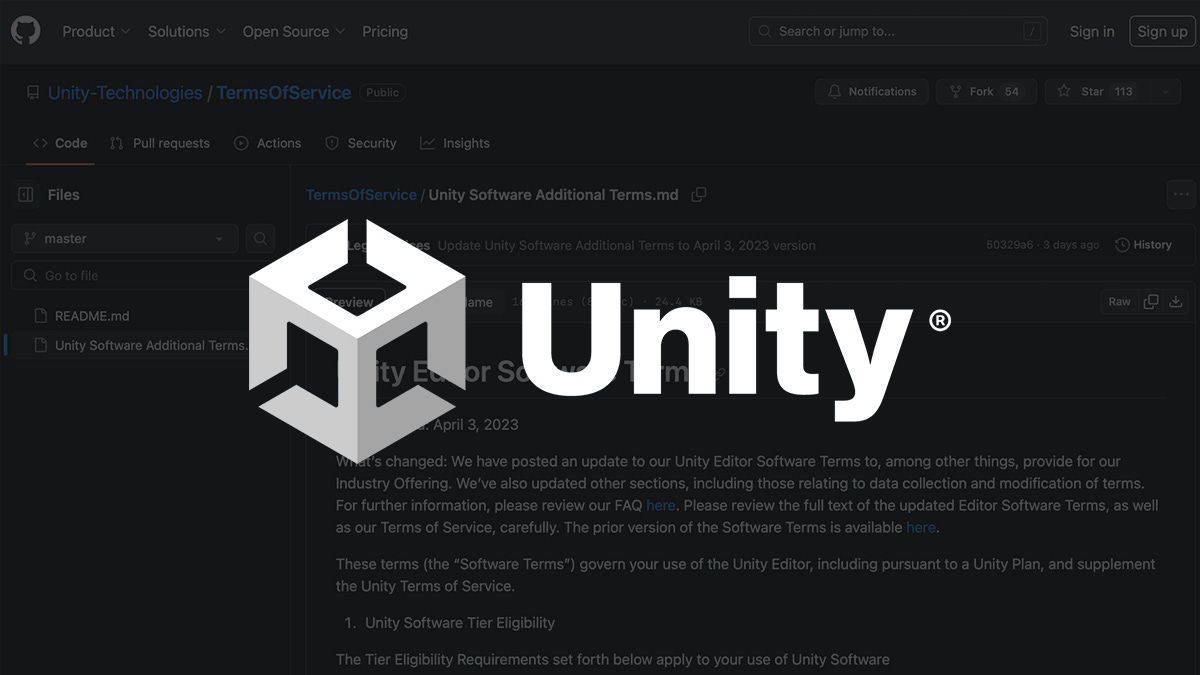Trending
Opinion: How will Project 2025 impact game developers?
The Heritage Foundation's manifesto for the possible next administration could do great harm to many, including large portions of the game development community.
Update: A company spokesperson has since clarified only the Github repository version of Unity's ToS were removed, while there was "never one moment" they weren't available on its website.

A Unity representative claims the company pulled its terms of service (ToS) from Github because "views were so low."
Amid the furor surrounding the company's decision to implement and eventually significantly revamp a new Runtime Fee, some developers noticed the engine maker had taken down a Github repository over the last few months that allowed users to track changes to the Unity ToS.
During a recent interview with Game Developer, Unity Create president Marc Whitten admitted that he personally wasn't aware the repository existed until last week, but confirmed the company would be reinstating it "with all the terms of service [versions]."
Notably, Whitten said its removal had "nothing to do" with the Runtime Fee, pushing back on claims made by some developers who suggested Unity may have torched the repo to make it harder for users to track changes to the ToS and how the new policy might affect them.
Shortly after Unity debuted its new-look Runtime Fee, a company representative called "Dana" said the engine maker is "genuinely disappointed at how our removal of the ToS has been reframed across the internet," and claimed it was pulled "way before the pricing change was announced because the views were so low, not because we didn't want people to see it."
Dana was replying to an X (formerly Twitter) user who asked Unity how it would guarantee users can lock in agreements based on the ToS version they're currently using to prevent the rug from being pulled out from under them in the future. In response, Dana said Unity has "heard the concerns from the community about ToS loud and clear."
"This new Runtime Fee policy will only apply beginning with the next LTS version of Unity shipping in 2024 and beyond," they added. "And Marc's response is true, you can stay on the terms applicable for the version of Unity you are using as long as you keep using that version."
Unity has subsequently republished its Github repository, which contains all current and prior versions of the Unity Editor Software Additional Terms from June 28, 2016. Writing on Github, the company said the Unity Legal webpage is the best to find all of its latest agreements in one place.
Still, the company's explanation as to why it removed the Github repository has raised a few eyebrows, and that's a problem given Unity is currently attempting to rebuild trust with a community of developers who feel betrayed by its chronic mishandling of the Runtime Fee debacle.
Game Developer has reached out to Unity to clarify the comments made on X.
Update: In an email to Game Developer, a Unity spokesperson claimed its Terms of Service were "never removed," and that it was just the Github repository version that was taken down because there were "no views" on its page.
"Our Terms of Service always lived at our legal page," they wrote. "There was never one moment where ToS weren’t available to any global user."
You May Also Like